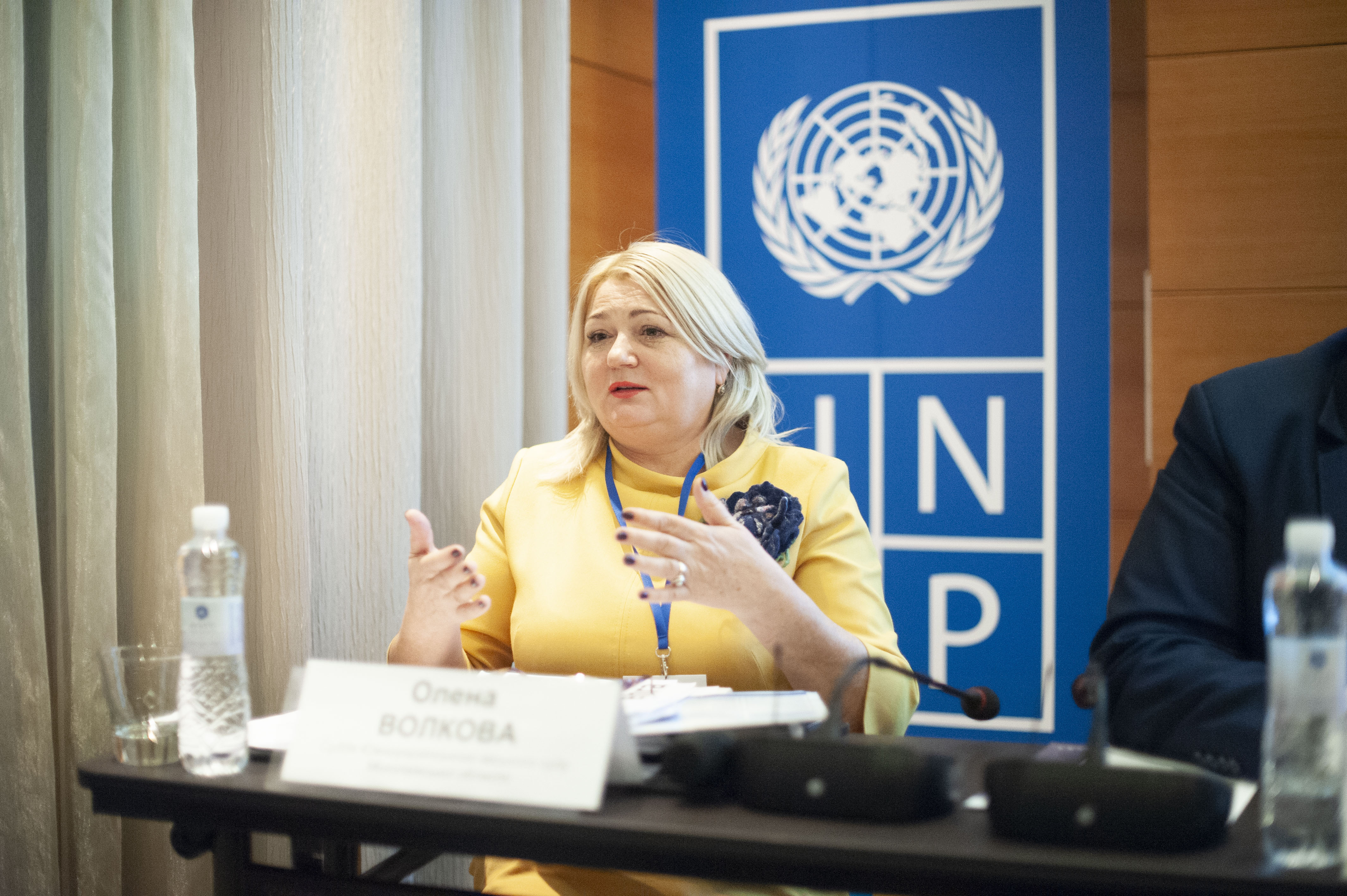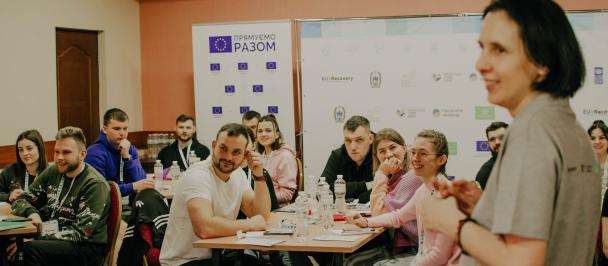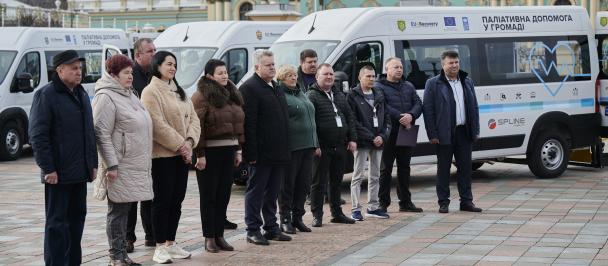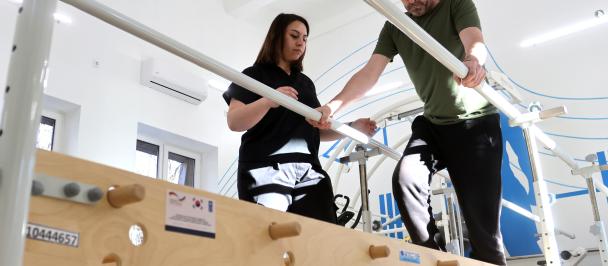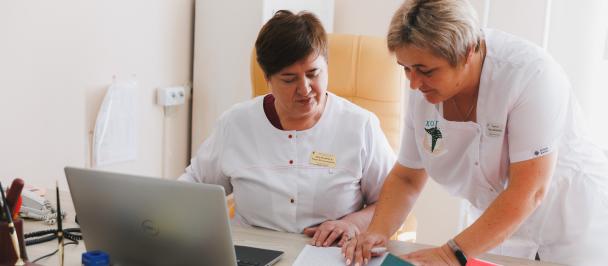From the left to the right: Olga, Anna, Diana (Anna’s girlfriend), and Oksana. Photographer: Oleksandr Filonenko / UNDP Ukraine
Approximately 240,000 people in Ukraine are HIV positive, and it is estimated that more than 40 percent of them are unaware of their HIV status. Many of those that are aware experience stigma, discrimination and systematic human rights violation.
Three women shared with us their stories of living with HIV in Ukraine, and the difficulties they face due to being HIV positive.
Anna, 38
"There were no drugs, blood transfusions or unreliable sexual relations in my story. When I found out that I have HIV, I pursued the doctor and asked for a second test, because I though the first result had to be incorrect. However, I got nothing but a scornful look in response."
In 2006 Anna was hospitalized with an ectopic pregnancy. After undergoing surgery, Anna was informed that she was HIV positive.
Anna tried to work out what she should do next, but the doctor at the local AIDS centre only shrugged his shoulders.
“At that moment I needed support and information about HIV, but the doctors couldn’t provide it to me. Maybe they didn’t have any information themselves. They didn’t even give me the contacts of people who could help,” Anna recalls.
Left without the help she needed, Anna stopped attending the AIDS Centre and had to cope with HIV by herself.
In 2008, she was hospitalized with an ectopic pregnancy for a second time. Again, she underwent surgery and an HIV test, and again she experienced the scornful attitude of doctors. In the face of their condemnation and contempt, Anna even decided to refuse antiretroviral therapy (ART).
However, she still wanted to have a baby. She applied to the state-run in vitro fertilization (IVF) programme. But at that time people with HIV were not allowed to participate in the state programme of IVF.
She decided to start ART treatment in 2011 when she was diagnosed with tuberculosis. In this case, she also faced contempt and humiliation from medical workers.
“Written on my medical card, in big red letters, was ‘B20.’ The doctors use this code to mark patients with HIV. All the dispensary’s nurses gathered at the front desk and began scornfully talking about my having HIV. They didn’t care that I was close around” Anna says.
Are there any changes in social attitudes to people with HIV today?
Anna: “I can’t say that the situation has changed. As before, there are people who perceive the patients with HIV adequately, as well as people who continue to discriminate against us, and stigmatize us.”
Olga, 44
In 2006, Olga was detained by police. She fell ill at the police station, so she was taken to hospital, accompanied by the police.
"I couldn’t feel my feet, I took a step and fell down. The police officers brought me to the reception area and threw me onto the concrete floor. I asked the nurse to help me to sit on the bench. I explained to her that I have HIV, so if stayed on the cold floor I could get ill and die. However, she started shouting that she would need to sterilize the bench after me and refused to help.”
Olga started crawling to the bench on her own. When the police officers noticed, they came up to her and started yelling at to her stay where she was. Olga did not listen to them and continued to crawl towards the bench. The police officers started to push her away with their feet. They pushed her into a corner, where she lost consciousness.
"It still makes me anxious when I recall the taste of blood and sand on my teeth. It is scary to think that it happened at a health centre, where I’d been brought to get medical assistance,” says Olga.
In the morning, the same police officers told Olga she was free to go. She had hematomas around her eyes, bruises and a terrible headache. Shortly after, Olga was diagnosed with a subdural hematoma – a potentially life-threatening condition, when a blood vessel near the brain bursts. She had to undergo surgery.
Olga says it was very difficult to get justice. Her father gave a statement to the prosecutor's office, but when they got the reply, Olga's family realized that those who had mistreated her would not be punished. Olga was diagnosed with moderate injuries, which could have been the basis of a criminal case. Only after Olga’s father visited the prosecutor's office to appeal its decision were the perpetrators suspended from duty for some time. But there the story ended.
In 2018, Olga’s worsening health forced her to go to a medical institution to undergo assessment to receive the status of a person with disabilities.
"The doctors wouldn’t even say ‘HIV.’ At the commission, I was asked, ‘Where did you get THIS from?’ I asked them to specify what ‘THIS’ meant. ‘Well, THIS – for which you take your medication,’ they answered.”
The medical commission refused to give Olga the status of a person with disabilities without even examining her, and only asked a few questions. Objecting to the commission’s assessment, Olga was referred to a regional commission, which also refused to give her the status of person with disabilities. They then said she had to attend another commission in another city. Olga explained that she was raising a small child on her own, and so was unable to go. But the commission did not care. So, with the help of lawyers, Olga wrote an appeal to the president, which was sent on to the regional Department of Health. The department considered her appeal and decided that she could be reassessed only if her health condition worsened.
Are there any changes in social attitudes to people with HIV today?
Olga: “Last year I was assessed by the commission again. This time I was not put under any pressure and successfully received the status of a person with disabilities. The doctors understood that I was not able to go to another city. They did their best for me to get the necessary examinations in my city. You know, there are people in this system who can find an individual approach and who actually want to help a patient.”
Oksana, 41
"I found out that I have HIV during my pregnancy in 2001. At that time, such tests were done only once – in the middle of pregnancy. If the result was positive, the sample was sent for additional testing. That took a long time, so I received the result just a week before giving birth.”
Oksana gave birth to a healthy child, and her husband was not HIV positive. Three years earlier, Oksana had been raped. However, it was impossible to know exactly if that caused the infection, as HIV tests had not provided the quick results at that time.
Due to the low immunity, Oksana started having health problems. In 2005, she visited a gynaecologist. But when the doctor saw the B20 code on the woman's medical card, she refused to examine Oksana with her instruments. Even though Oksana had come with a previously purchased gynaecological kit, the doctor forced the woman to buy professional instruments at a pharmacy for the examination. When Oksana returned to the doctor, she explained that the pharmacy did not have the required instruments. Then the doctor rudely refused to examine Oksana.
"She yelled, ‘Why are people with HIV coming to me, why do I have to examine them with my instruments?’ I left her office, but the doctor didn’t calm down - she ran after me into the hallway and continued insulting me in the presence of other patients."
Are there any changes in social attitudes to people with HIV today?
Oksana: “Of course, attitudes are changing. But it would be better if the changes happened faster. You still get denials of assistance, disparagement, in spite of all the information campaigns. No one is frightened or runs out of the building when they hear I’m HIV positive, but doctors can still refuse to help me without giving a reason.”
What does the law say?
Photographer: Stella Shabliovska
We asked Olena Volkova, a judge of the South Ukrainian City Court of Mykolaiv Oblast to comment on the cases of these women:
Have Ukrainian citizens with HIV the right to adopt a child?
Volkova: “Kyiv District Administrative Court has ruled illegal and invalid the paragraph of Executive Order 479 of the Ministry of Health, according to which HIV-positive people have no right to adopt children, as it ruled the paragraph to be discriminatory.”
Can police use force against detainees, and how can abuse of power by police officers be proved?
“In the case of Olga, the use of force against a person with a dangerous health condition was groundless. De facto, the police officers exceeded their authorities, and under Part 2 of Article 365 of the Criminal Code this is punishable by imprisonment for a term of three to eight years, with the deprivation of the right to hold specific positions, or conduct certain activities for a term of up to three years."
In such cases, Volkova recommends drawing the attention of other people to the situation by getting witnesses, requiring the police officers to provide their police certificates, and immediately calling your family or a lawyer, as each detainee has the right to a phone call.
Under what circumstances can a doctor refuse to provide medical assistance?
According to Volkova, a doctor has the right to refuse to treat a patient if:
- The patient does not comply with medical instructions, provided refusal of treatment does not endanger the patient's life or the health of people near them;
- The patient violates the rules of the health care facility – again, provided refusal of treatment does not endanger the patient's life or the health of people near them.
“If the doctor or health care facility cannot provide the appropriate treatment, the staff should redirect the patient to another health care facility, where they can receive the necessary care. In Oksana's case, we see the blatant violation of her human rights, and discrimination."
Are there legal mechanisms to punish health care staff who disclose a patient’s HIV positive status?
Volkova said that according to Article 145 of the Criminal Code, if the deliberate disclosure of a medical secret causes grave consequences, the perpetrators can be fined, can be forced to perform public or correctional service, and can be deprived of the right to hold specific positions or conduct certain activities.
“Suicide, or the infliction of physical damage, mental illness and so on, can be recognized as grave consequences of the offence. However, a link between the grave consequences and the disclosure of the medical secret has to be established.”
Addendum
In 2018, the United Nations Development Program (UNDP) organized the first national platform for judges on HIV, tuberculosis and human rights in Ukraine to discuss the role of judges in eliminating the stigmatization of, and discrimination against, people living with HIV and tuberculosis in Ukraine. The judges have the professional potential to bring about real changes to the legal environment in this sphere.
Text: Kostiantyn Prymak, Anton Sydorenko Photos: Oleksandr Filonenko, Stella Shabliovska / UNDP Ukraine

 Locations
Locations